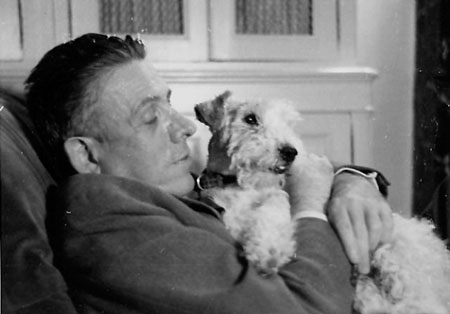In today’s Wall Street Journal “Sightings” column I commemorate the fiftieth anniversary of the death of Francis Poulenc. Here’s an excerpt.
* * *
When Francis Poulenc died fifty years ago this month, the world of classical music sorrowfully noted the passing of a delightful artist of the second rank. Even his friends seem to have thought him a bit of a lightweight. The British composer Lennox Berkeley, who knew and loved Poulenc, wrote an obituary that praised the “touching tenderness and simplicity of heart” of his ever-so-French music–but went on to say in the very next breath that he “lacked the power of large-scale construction.” Talk about faint damns!
 That was in 1963, at a time when the classical-music establishment was still in thrall to the postwar professoriat of Austro-German composers and their foreign epigones who believed that the future of music lay not with traditional harmony but with Schoenberg-style serialism. They thought it to be historically inevitable, and had no use for those who disagreed. Least of all did they care for composers who, like Poulenc, happily embraced tunefulness and wit and sought to give pleasure to their audiences. Such dour folk took it for granted that pleasure was bad for you.
That was in 1963, at a time when the classical-music establishment was still in thrall to the postwar professoriat of Austro-German composers and their foreign epigones who believed that the future of music lay not with traditional harmony but with Schoenberg-style serialism. They thought it to be historically inevitable, and had no use for those who disagreed. Least of all did they care for composers who, like Poulenc, happily embraced tunefulness and wit and sought to give pleasure to their audiences. Such dour folk took it for granted that pleasure was bad for you.
Today the avant-garde monopoly is a thing of the blessedly distant past, but Poulenc, though his music continues to be played around the world, is still widely seen as a lightweight. Not that there’d be anything wrong with that–lightness of touch has always been undervalued in the world of art–but to write him off as a mere charmer is perversely wrongheaded….
What is it about Poulenc’s music that makes it hard for some listeners to understand exactly how good it is? Part of the problem, I suspect, is that he really did start out as a lightweight, an impish comedian with a dilettantish streak. His first great success, “Le Bestiaire” (1919, words by Guillaume Apollinaire), was a song cycle about animal life that is scarcely four minutes long. Even after his music grew more ambitious, he was still inclined to slip his audiences the occasional wink….
For all his humor, though, Poulenc was at bottom a deeply serious artist who never quite managed to reconcile the two sides of his no less deeply divided personality….
* * *
Read the whole thing here.
Jean-Pierre Rampal plays the slow movement of Francis Poulenc’s Flute Sonata, accompanied by the composer:
Terry Teachout on the arts in New York City
An ArtsJournal Blog
